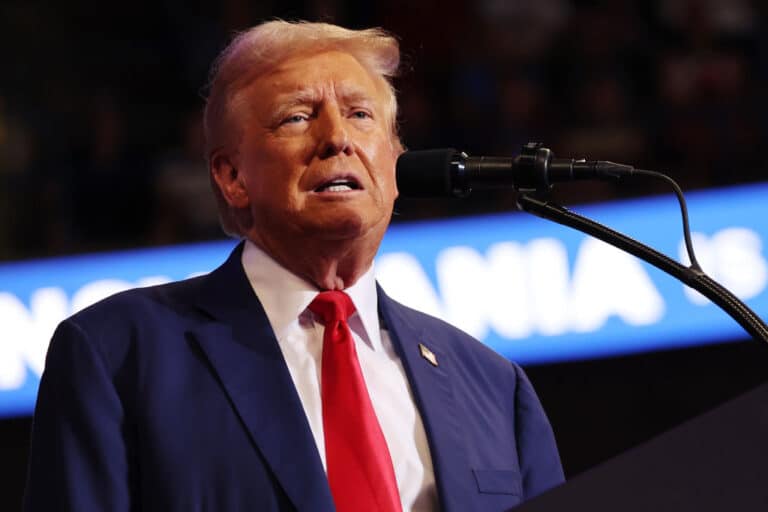
Donald Trump won a sweeping victory in the presidential elections on Tuesday and will become the 47th president of the United States on Jan. 20.
Although Trump has already served as president before, many are wondering how his win will affect Israel this time.
Trump’s positions on Israel in his first term
In his first term, from 2016-20, Trump was staunchly pro-Israel.
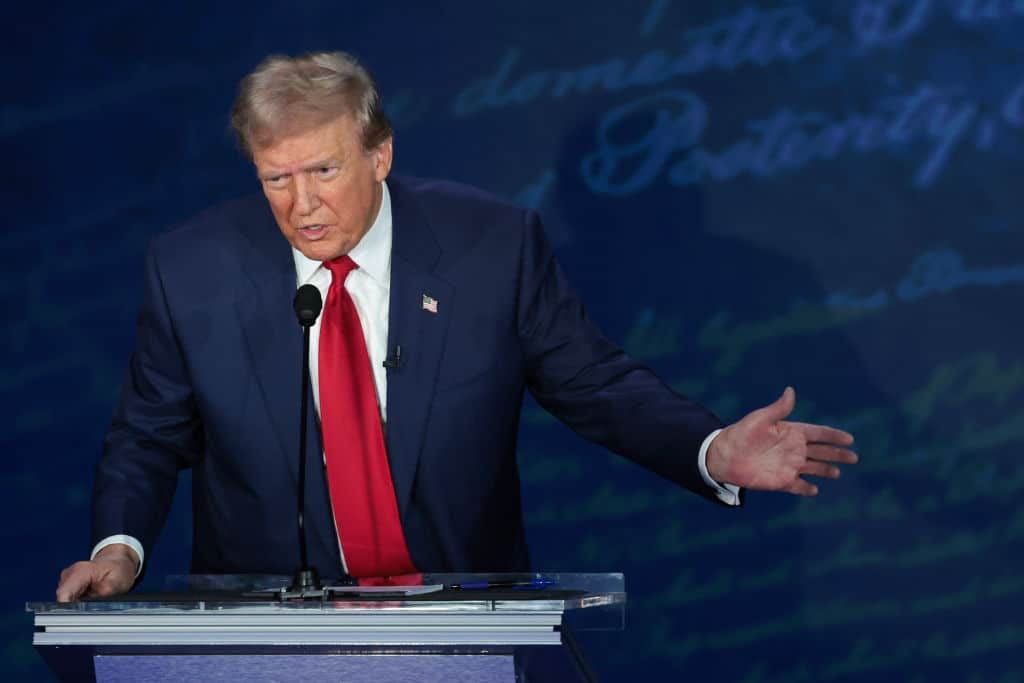
In 2017, he officially recognized Jerusalem as Israel’s capital and moved the U.S. embassy from Tel Aviv to Jerusalem. Several other countries followed suit and moved their embassies as well. The move strengthened Israel’s claim to the city after years in which the international community largely refused to fully recognize Israel’s sovereignty over Jerusalem.
In 2019, Trump officially recognized Israeli sovereignty over the Golan Heights, an area that was captured from Syria during the Six-Day War. The U.N. and much of the international community do not recognize Israel’s sovereignty over the Golan Heights, which made this decision a significant move against international opinion.
In 2018, Trump cut off all American funding to the United Nations Relief and Works Agency for Palestine Refugees in the Near East, arguing that the U.S. had been shouldering a “very disproportionate share of the burden of UNRWA’s costs.”
The administration’s main complaints about UNRWA concerned its fiscal practices and its perpetuation of the Palestinian refugee crisis. The agency has since come under increased scrutiny due to mounting evidence of its role in the Oct. 7 massacre and the violent, antisemitic curriculum taught in its schools.
Additionally, in 2018, Trump withdrew from the Iran nuclear deal, officially known as the Joint Comprehensive Plan of Action. The deal reduced sanctions on Iran in return for the Islamic Republic rolling back its nuclear activity.
Israeli officials and other world leaders had long argued that Iran wasn’t actually complying with the deal and was still pursuing nuclear weapons. Several Middle Eastern countries also warned that Iran was using the money from its newly unburdened economy to fund terrorist groups destabilizing the region.
The decision to withdraw from the deal brought new sanctions on Iran, severely damaging the country’s economy. Iran also jump started its nuclear program, quickly reaching a point where it now could obtain a nuclear weapon within a matter of months, or even weeks.
In 2020, the Trump administration helped finalize the Abraham Accords, a set of normalization agreements between Israel, Morocco, Bahrain, and the United Arab Emirates. These were the first peace deals between Israel and Arab states since the peace agreements with Egypt in 1979 and Jordan in 1994.
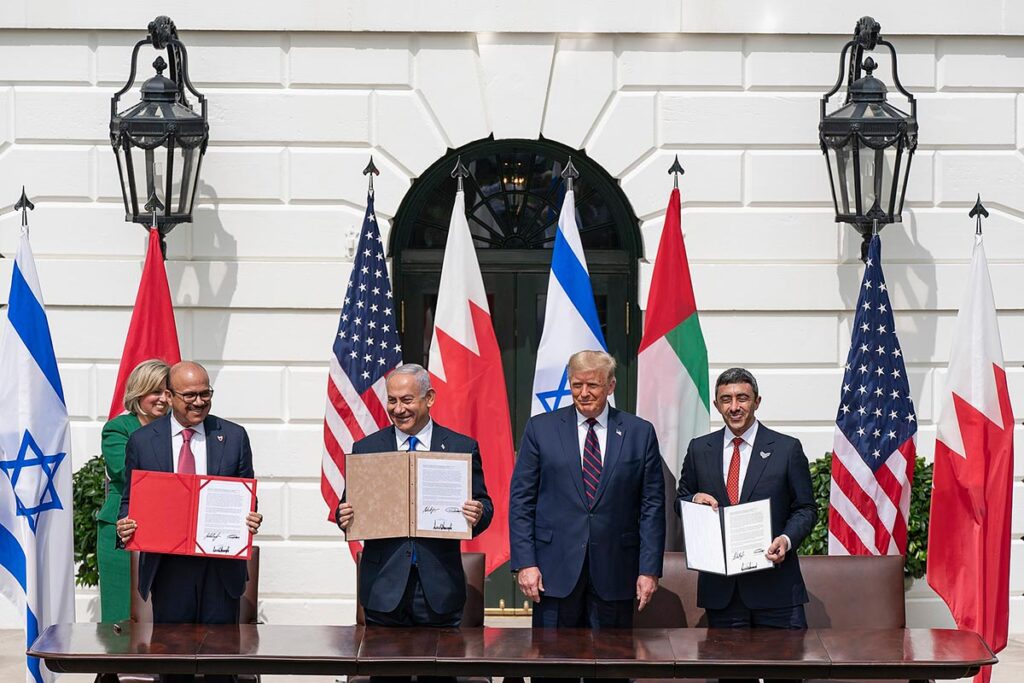
While Trump’s first term was overwhelmingly pro-Israel, his statements in this race and the shifting positions of the general Republican Party have raised concerns that this term might be somewhat different.
Trump wants to end the war in Gaza and Lebanon quickly
Throughout his presidential campaign, Trump reiterated that he wanted to see the war in Gaza end quickly.
In April, Trump said that Israel needs to “Get it over with,” adding, “Let’s get back to peace and stop killing people.” He also stressed that “they’ve got to finish what they started, and they’ve got to finish it fast, and we have to get on with life.”
In October, Trump sent a letter to Lebanese Americans vowing to “stop the suffering and destruction in Lebanon,” although he didn’t clarify how he would do so.

In his victory speech on Wednesday, Trump stressed, “I’m not going to start a war, I’m going to stop wars.”
Trump hasn’t said exactly how he wants to see the war in Gaza end, but some Israeli officials are concerned he could increase pressure on Israel to reach a ceasefire even under unfavorable conditions. Internal Israeli politics concerning a ceasefire may also make reaching an end to the war difficult, if not impossible, in the near future, and Israeli officials are unsure how Trump will react to that.
The head of Arab-Americans for Trump, Bishara Bahbah, has claimed that Trump may consider imposing an arms embargo on Israel if the government refuses to end the war.
Bahbah stressed that “the Trump of 2016 and 2020 is a very different person than the Trump of 2024.”
“He’s been exposed to the Arab Muslim American communities. He has had at least 15 meetings with Arab and Muslim leaders.”
On the other hand, Trump has also condemned Biden for interfering in Israel’s decision-making during the war. The president-elect insisted that Israel was much stronger in the war because the government refused to listen to Biden.
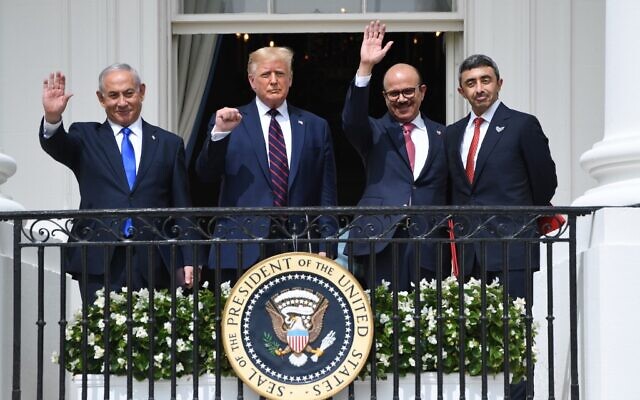
In a conversation with Prime Minister Benjamin Netanyahu last month, Trump told the prime minister to “do what you have to do” concerning the war in Gaza.
The president-elect may aim for a somewhat hands-off approach concerning Israel and other foreign policy issues. In some ways, that may benefit Israel, but in other ways, it could pose a challenge to the Jewish state.
Will the U.S. help Israel strike Iran?
If Israel ever decides to strike Iran’s nuclear program directly, it will likely need the direct involvement of the U.S.
Many of Iran’s nuclear facilities are located deep underground, so deep that only the most powerful “bunker buster” bombs can affect them. These bombs are so large that they can only be carried by aircrafts known as large bombers, such as the B-2 bomber, that only the U.S. possesses. Some of Iran’s nuclear facilities may be deep enough that they could even survive these bombs.
There have been efforts to adapt other aircrafts to carry these bombs, but it may be a while until this bears fruit. Until then, if Israel decides to go after the nuclear program, it will either need the U.S. to give it the bombers it needs or for the U.S. to carry out the strikes alongside Israel.

Many of the officials who made up Trump’s first administration, including his son-in-law Jared Kushner, don’t intend to return for his second term. Instead, the people he’s been surrounding himself with recently have often been more isolationist, believing the U.S. should be less involved in global affairs and should instead focus on itself.
This includes Vice President-elect J.D. Vance, who strongly opposes American military involvement abroad, including in the Israel-Hamas war and the war in Ukraine.
In a recent interview, Vance stressed that Israel’s interests and those of the U.S. would not always overlap, noting specifically that “our interest, I think, very much, is in not going to war with Iran.”
In his last term, Trump was already making extensive efforts to pull out of the Middle East.
In 2019, Trump ordered the withdrawal of all U.S. troops from northern Syria, despite warnings that this could harm the fight against ISIS and betray the Kurdish forces who fought alongside the U.S. After extended efforts from both U.S. military officials and world leaders, the Trump administration later agreed to slow the withdrawal, keeping hundreds of troops in the area.
In Nov. 2020, the Trump administration announced that it was aiming to pull all American troops out of Iraq and Afghanistan within a matter of months. In Feb. 2020, Trump signed an agreement with the Taliban to release many of its fighters and to withdraw U.S. forces out of Afghanistan within about a year.
While Trump’s new administration is seemingly opposed to military interventions, Trump has expressed support for intensifying economic sanctions against Iran. Such sanctions would likely heavily disrupt Iran’s efforts to fund and rebuild its proxies in the Middle East, especially in the aftermath of the ongoing war in the region.
The Middle East, however, isn’t the only front where the decisions of the incoming Trump administration could have effects on Israel.
The link between Ukraine and Israel
The incoming Trump administration seems to be overwhelmingly opposed to continuing military aid to Ukraine.
In July 2023, Trump said that he would tell Ukrainian President Volodymyr Zelensky “no more. You got to make a deal. I would tell Putin, if you don’t make a deal, we’re going to give him a lot. We’re going to (give Ukraine) more than they ever got if we have to.”
Ukrainian leaders have expressed concerns that a Trump administration could force them into an unfavorable ceasefire agreement with Russia. The Trump administration is reportedly considering blocking Ukraine from applying for NATO membership for the next 20 years, as well as a push to turn eastern Ukraine into a demilitarized zone.
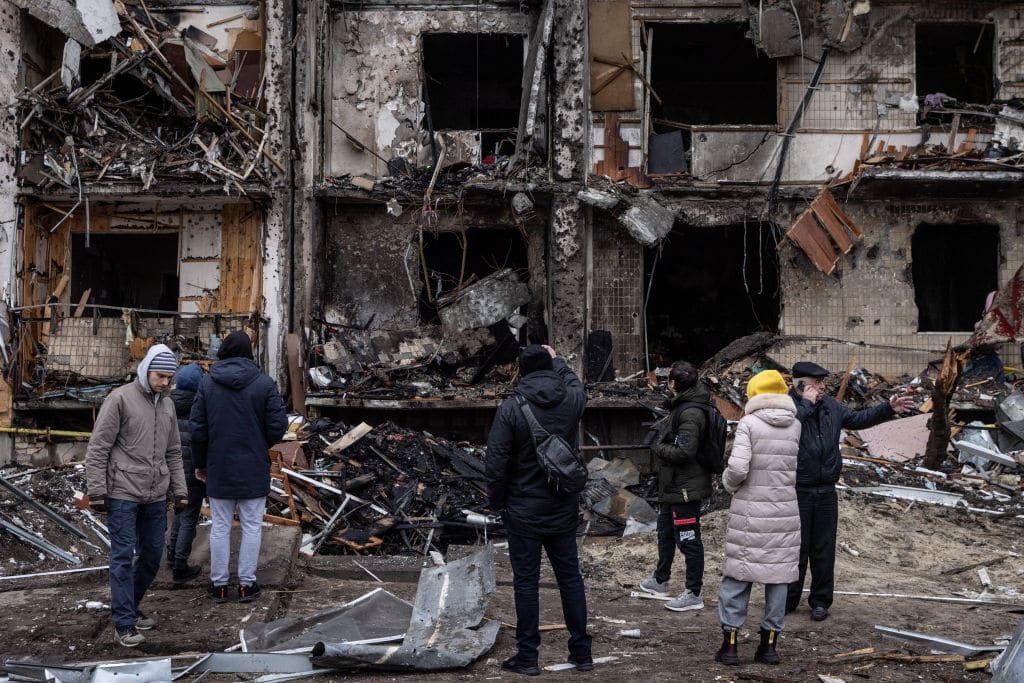
Russia has demanded that Ukraine be completely demilitarized and that the country adopt several laws aimed at replacing Ukrainian culture with Russian culture as part of any peace agreement. Ukraine would also be banned from seeking alliances with Western countries. Russia has also demanded that Ukraine hand over Crimea and the Donbas region, as well as other parts of eastern Ukraine.
Ukraine is unlikely to accept any of these demands, which would severely impact its sovereignty.
While the war in Ukraine may seem irrelevant for Israel, there are actually several factors that could impact the Jewish state.
For one, Russia has been growing much closer to Iran over the past few years. Iran has provided missiles and drones to Russia to use in Ukraine, while Russia has reportedly promised to provide Iran with advanced fighter jets and air defense systems.
Since Russia is tied up with the war in Ukraine, it has been taking more than giving in its relationship with Iran. If the war ends, especially with Russia in a strong position, that situation could flip, and Russia could help Iran significantly upgrade its military as thanks for its help.
Since Oct. 7, Russia has taken a strikingly anti-Israel position, repeatedly condemning the Jewish state and promoting efforts to implement sanctions against Israel.
Whether Russia would directly threaten Israel or simply indirectly harm the Jewish state by upgrading military ties with Iran, Syria, Hezbollah, and other similar parties remains unclear. However, as long as it remains tied up with the war in Ukraine, it doesn’t really have the resources to do much on those fronts.
Confusion surrounding Trump’s foreign policy
Part of the problem in trying to determine whether Trump will be good for Israel or not is that no one is quite sure what his positions are, and in the past, he has been somewhat spontaneous and unpredictable in his decision-making.
For example, some former advisors of the president-elect have said Trump was interested in leaving NATO in his first term and believed in reducing pressure on some autocrats, like Russia’s Putin and North Korea’s Kim Jong Un.
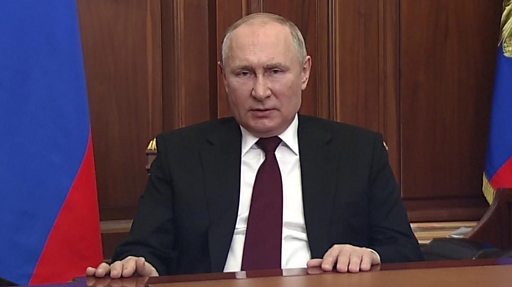
“He thought (Vladimir) Putin was an okay guy and Kim (Jong Un) was an okay guy that we had pushed North Korea into a corner,” retired General John Kelly, the White House chief of staff under Trump, told CNN. “To him, it was like we were goading these guys. ‘If we didn’t have NATO, then Putin wouldn’t be doing these things.’”
While, in the end, Trump decided not to withdraw from the alliance, administration officials noted that they were unsure what he would decide until the last moment.
“Honest to God, it was frightening because we didn’t know what he was going to do up until the last minute,” recalled John Bolton, who served as the national security advisor under Trump.
The European Council on Foreign Relations described the president-elect’s decision making as “erratic and inconsistent” in a policy brief earlier this year.
A major factor that will likely affect Trump’s foreign policy is the makeup of his administration. In his first term, the president-elect often was discouraged from extreme ideas by more moderate staffers who were able to convince him to shift course.
Many of those staffers, however, have said they don’t plan to return for a second term. At the moment, Trump appears to be surrounded by more extreme voices, although that could change by the time he enters office. Who he picks to serve in key defense and foreign policy roles will likely be one of the main determining factors on how the next four years look for the world.
At the moment, the only thing that is absolutely clear is that nothing is clear. No one is quite sure how this administration will affect Israel or the world. Until Inauguration Day, and possibly even after, the future of U.S. foreign policy will remain a question mark.
